A Utah couple made a huge beginner's gardening mistake in an attempt to rewild their yard.
In a post on r/NativePlantGardening, the novice explained that after swapping their traditional lawn with native plants a few years ago, they didn't realize the extent to which their lawn was plagued by bindweed.
After spending countless hours pulling the invasive weeds in the summer, they only came back stronger the following spring.
Now the soil beneath their native garden of Lewis blue flax, milkweed, lupine, snowberry, and serviceberry is 80% bindweed, making them question whether or not they should start over and do it the right way from the beginning.
Bindweed is an elusive and tricky weed to manage. With creeping vines that can strangle plants, they can live dormant in the soil for up to 60 years, as reported by the Nebraska Institute of Agriculture and Natural Resources.
The U.S. Geological Survey reported that each year in the U.S., around one billion pounds of pesticides are used to manage lawns, pests, and weeds. The chemicals in these products are known to cause cancer, among other health concerns.
It is important to adopt methods of weed retrieval that don't use harmful chemicals to ensure a healthier and greener planet.
Traditional lawns are the most grown crop in the United States. According to the Princeton Student Climate Initiative, they cover more than 40 million acres of land — and they're just for presentation. Not to mention, they're expensive and exhausting with no benefits.
Native lawns are helping homeowners minimize exposure to harmful chemicals and cut down on money since they require less water, less fertilizer, and zero pesticides to thrive.
🗣️ If you were to switch from a grass lawn to a more natural option, which of these factors would be your primary motivation?
🔘 Making it look better 🌱
🔘 Saving money on water and maintenance 💰
🔘 Helping pollinators 🐝
🔘 No way I ever get rid of my lawn 🚫
🗳️ Click your choice to see results and speak your mind
Native plants also help attract local pollinators and wildlife. Bees pollinate approximately 80% of all flowering plants and 35% of food crops consumed by humans. Rewilding won't only make gardening easier — it's also extremely beneficial to the ecosystem and human survival.
From clover lawns and vegetable gardens to wildflowers and meadows, there are plenty of options to rewild your space.
The post received many comments urging the couple to continue their fight against the bindweed using mulch and other non-toxic methods.
"Don't be too hard on yourself. Invaders are invasive for a reason," one Redditor said.
"Live and learn!" another encouraged.
"It's okay to make mistakes," the original poster agreed in an edit to the post after receiving so much positive feedback.
Join our free newsletter for easy tips to save more, waste less, and help yourself while helping the planet.









